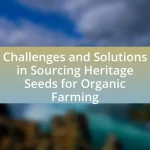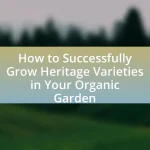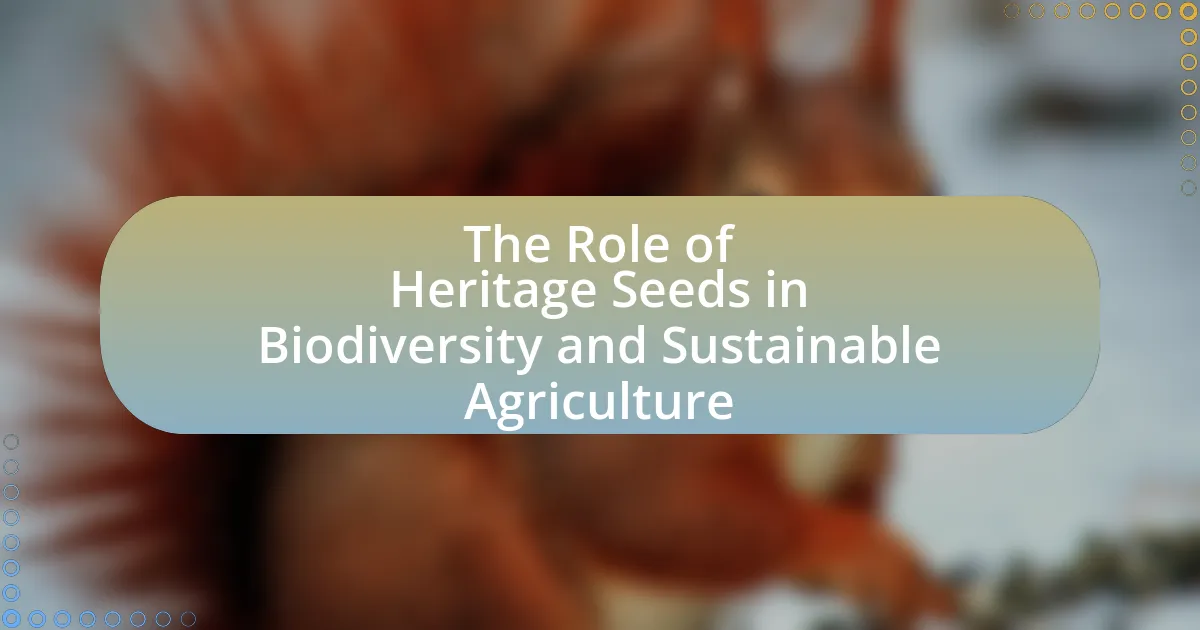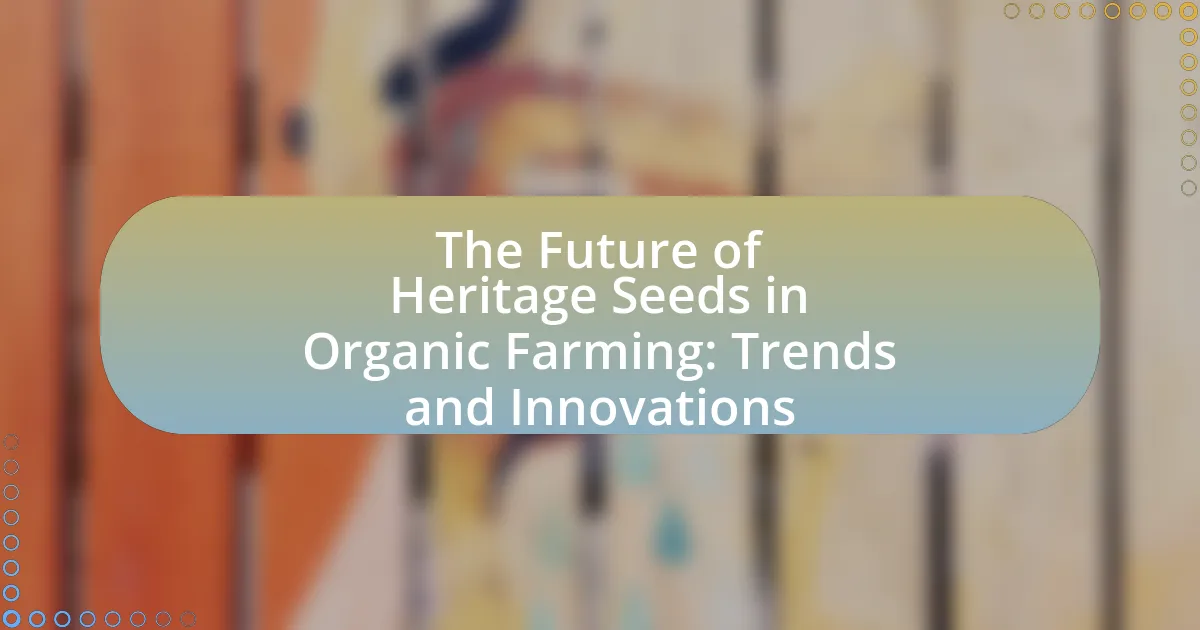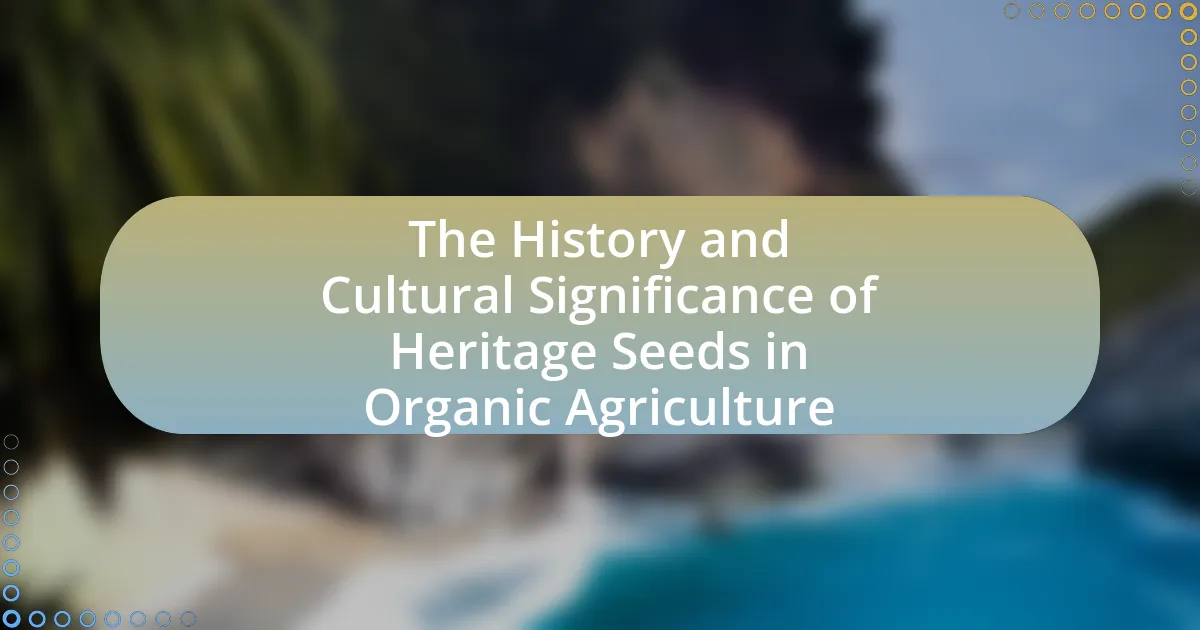Heritage seeds are traditional, open-pollinated varieties that have been passed down through generations, known for their genetic diversity and adaptability to local conditions. This article explores the significance of heritage seeds in organic products, highlighting their role in promoting biodiversity, enhancing soil health, and supporting sustainable agriculture. It contrasts heritage seeds with hybrid and GMO seeds, discusses their characteristics, and emphasizes their contributions to ecosystem health and food security. Additionally, the article outlines practical steps consumers can take to support heritage seeds, including identifying products, advocating for their use, and engaging with local farmers and communities.
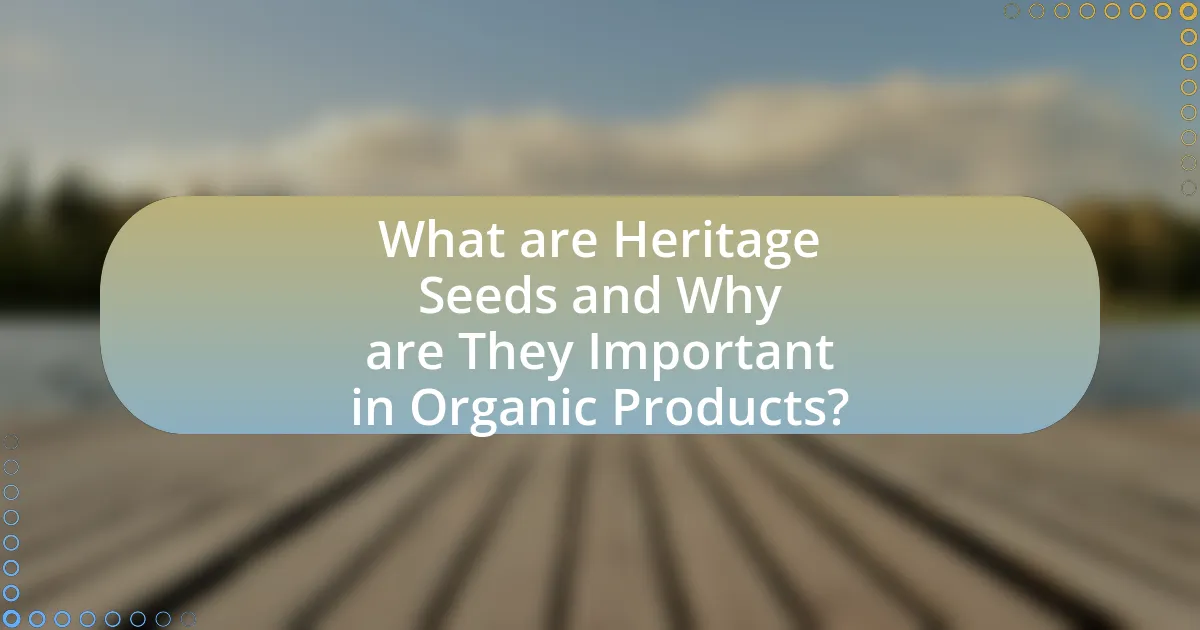
What are Heritage Seeds and Why are They Important in Organic Products?
Heritage seeds are traditional varieties of seeds that have been passed down through generations, often characterized by their genetic diversity and adaptability to local growing conditions. These seeds are important in organic products because they promote biodiversity, enhance soil health, and contribute to sustainable agriculture practices. Studies have shown that heritage seeds can yield crops that are more resilient to pests and diseases, reducing the need for chemical interventions. Additionally, using heritage seeds supports local ecosystems and preserves agricultural heritage, which is vital for food security and cultural identity.
How do Heritage Seeds differ from Hybrid and GMO Seeds?
Heritage seeds are open-pollinated varieties that have been passed down through generations, while hybrid seeds are created through controlled pollination between two different parent plants, and GMO seeds are genetically modified organisms altered at the DNA level. Heritage seeds maintain genetic diversity and are often more resilient to local growing conditions, whereas hybrid seeds may offer higher yields but can be less adaptable and often require specific growing conditions. GMO seeds are engineered for traits such as pest resistance or herbicide tolerance, which can lead to environmental concerns and loss of biodiversity. The distinction lies in their breeding methods and implications for agriculture, with heritage seeds promoting sustainability and preserving traditional varieties.
What characteristics define Heritage Seeds?
Heritage seeds are defined by their open-pollinated nature, which allows them to be naturally pollinated and produce seeds that are true to type. These seeds are typically heirloom varieties, meaning they have been passed down through generations, often for at least 50 years, and are valued for their genetic diversity, flavor, and adaptability to local growing conditions. Heritage seeds are also non-hybrid and non-GMO, ensuring that they maintain their original characteristics without genetic modification. This preservation of traditional varieties contributes to biodiversity and supports sustainable agriculture practices.
Why are Heritage Seeds considered more sustainable?
Heritage seeds are considered more sustainable because they promote biodiversity and are adapted to local growing conditions. These seeds have been passed down through generations, allowing them to develop resilience to pests and diseases, which reduces the need for chemical inputs. Additionally, heritage seeds contribute to the preservation of genetic diversity in agriculture, which is crucial for food security and ecosystem health. Studies show that diverse cropping systems, which include heritage varieties, can enhance soil health and reduce reliance on synthetic fertilizers and pesticides, further supporting sustainable farming practices.
What role do Heritage Seeds play in biodiversity?
Heritage seeds play a crucial role in biodiversity by preserving genetic diversity within plant species. These seeds, often heirloom varieties, maintain traits that have been cultivated over generations, contributing to a wider gene pool. This genetic diversity is essential for ecosystem resilience, allowing plants to adapt to changing environmental conditions, pests, and diseases. Studies indicate that heritage seeds can enhance soil health and promote sustainable agricultural practices, further supporting biodiversity. For instance, the Seed Savers Exchange reports that over 25,000 varieties of heritage seeds are preserved, showcasing the importance of these seeds in maintaining agricultural diversity and food security.
How do Heritage Seeds contribute to ecosystem health?
Heritage seeds contribute to ecosystem health by promoting biodiversity and enhancing soil fertility. These seeds are often open-pollinated and adapted to local conditions, which helps maintain a diverse gene pool essential for resilience against pests and diseases. Research indicates that diverse plant varieties can improve ecosystem stability and productivity, as seen in studies showing that polycultures can yield higher overall productivity compared to monocultures. Additionally, heritage seeds support beneficial insects and wildlife, fostering a balanced ecosystem.
What are the risks of losing Heritage Seeds?
The risks of losing heritage seeds include the loss of biodiversity, which can lead to increased vulnerability of crops to pests and diseases. Heritage seeds, often adapted to local climates and conditions, provide genetic diversity that is crucial for food security. The extinction of these seeds can result in a reliance on a limited number of commercial varieties, reducing resilience in agricultural systems. According to the Food and Agriculture Organization, approximately 75% of crop diversity has been lost since the 1900s, highlighting the critical need to preserve heritage seeds for sustainable agriculture and ecosystem health.
Why should consumers care about Heritage Seeds in their food?
Consumers should care about Heritage Seeds in their food because these seeds promote biodiversity and preserve unique plant varieties that are often more resilient and flavorful than modern hybrids. Heritage Seeds, which are open-pollinated and have been passed down through generations, contribute to sustainable agriculture by maintaining genetic diversity, which is crucial for adapting to changing environmental conditions. Research indicates that crops grown from Heritage Seeds can have higher nutritional value and better taste, enhancing the overall quality of food. Additionally, supporting Heritage Seeds helps protect traditional farming practices and local ecosystems, fostering a more sustainable food system.
How do Heritage Seeds affect the nutritional value of organic products?
Heritage seeds enhance the nutritional value of organic products by preserving genetic diversity and promoting the cultivation of nutrient-dense varieties. These seeds often originate from traditional farming practices, which prioritize flavor and nutritional content over yield. Research indicates that heritage varieties can contain higher levels of vitamins, minerals, and antioxidants compared to their commercial counterparts. For instance, a study published in the Journal of Agricultural and Food Chemistry found that heirloom tomatoes had significantly higher levels of vitamin C and phenolic compounds than hybrid varieties. This evidence supports the assertion that heritage seeds contribute positively to the nutritional profile of organic products.
What is the impact of Heritage Seeds on flavor and culinary diversity?
Heritage seeds significantly enhance flavor and culinary diversity by preserving unique varieties that have distinct tastes and characteristics. These seeds, often passed down through generations, contribute to a broader range of flavors in fruits and vegetables compared to modern hybrids, which are typically bred for uniformity and shelf life. Research indicates that heritage varieties can possess higher levels of certain nutrients and phytochemicals, which not only enrich the culinary experience but also promote biodiversity in agriculture. For instance, a study published in the journal “Agriculture, Ecosystems & Environment” highlights that heritage crops can offer flavors that are often lost in commercial varieties, thereby supporting local cuisines and traditional cooking methods.

How Can We Educate Consumers on the Value of Heritage Seeds?
Educating consumers on the value of heritage seeds can be achieved through targeted awareness campaigns that highlight their unique benefits. Heritage seeds are genetically diverse, often more resilient to local pests and diseases, and contribute to biodiversity, which is crucial for sustainable agriculture. Research indicates that crops grown from heritage seeds can have superior flavor and nutritional profiles compared to hybrid varieties, as evidenced by studies showing higher antioxidant levels in heritage tomatoes. Additionally, workshops and community events can provide hands-on experiences, allowing consumers to taste and learn about the cultivation of heritage varieties. Engaging storytelling about the history and cultural significance of these seeds can further enhance consumer appreciation and understanding.
What strategies can be used to raise awareness about Heritage Seeds?
To raise awareness about Heritage Seeds, educational campaigns that highlight their historical significance and biodiversity can be implemented. These campaigns can include workshops, community events, and social media outreach that inform consumers about the benefits of Heritage Seeds, such as their resilience and unique flavors. Research indicates that consumers are more likely to support sustainable practices when they understand the ecological and cultural importance of these seeds, as evidenced by a study published in the Journal of Agricultural and Environmental Ethics, which found that awareness initiatives significantly increased consumer interest in heritage varieties.
How can storytelling enhance consumer understanding of Heritage Seeds?
Storytelling can enhance consumer understanding of Heritage Seeds by creating emotional connections and contextualizing their historical significance. By sharing narratives about the origins, cultivation practices, and unique characteristics of Heritage Seeds, consumers can grasp their value beyond mere agricultural products. For instance, stories that highlight the role of Heritage Seeds in preserving biodiversity and cultural heritage can foster appreciation and awareness. Research indicates that consumers are more likely to engage with products that have a compelling story, as it helps them relate personally to the items they purchase, thereby increasing their perceived value and willingness to support sustainable practices.
What role do social media and digital platforms play in education?
Social media and digital platforms serve as vital tools in education by facilitating communication, collaboration, and access to information. These platforms enable educators to share resources, engage with students, and foster interactive learning environments. For instance, studies show that 70% of teachers use social media for professional development, enhancing their teaching strategies and connecting with peers globally. Additionally, digital platforms provide access to a wealth of educational content, allowing learners to explore topics at their own pace, which is particularly beneficial for understanding complex subjects like the value of heritage seeds in organic products.
How can farmers and producers effectively communicate the benefits of Heritage Seeds?
Farmers and producers can effectively communicate the benefits of Heritage Seeds by utilizing educational outreach, storytelling, and transparent marketing strategies. Educational outreach can include workshops, farm tours, and community events that highlight the unique characteristics and advantages of Heritage Seeds, such as their biodiversity, resilience, and superior flavor. Storytelling can engage consumers emotionally by sharing the history and cultural significance of these seeds, emphasizing their role in sustainable agriculture and food security. Transparent marketing strategies, including clear labeling and informative packaging, can provide consumers with factual information about the environmental benefits and nutritional value of Heritage Seeds, reinforcing their importance in organic products.
What educational materials can be developed for consumers?
Educational materials that can be developed for consumers include brochures, infographics, online courses, and videos focused on the benefits of heritage seeds in organic products. Brochures can provide concise information about the nutritional advantages and environmental benefits of heritage seeds, while infographics can visually represent data on biodiversity and sustainability. Online courses can offer in-depth education on organic farming practices that utilize heritage seeds, and videos can demonstrate the cultivation process and showcase success stories from farmers. These materials can effectively communicate the value of heritage seeds, supported by research indicating that heritage varieties often have higher nutritional content and better adaptability to local climates, thus promoting consumer awareness and engagement.
How can farmers engage with local communities to promote Heritage Seeds?
Farmers can engage with local communities to promote Heritage Seeds by organizing educational workshops and community events that highlight the benefits and history of these seeds. These initiatives can include hands-on demonstrations of planting and harvesting techniques, which not only educate participants but also foster a sense of community involvement. Research indicates that community-based programs can increase awareness and appreciation for local agricultural practices, as seen in the “Community Supported Agriculture” model, which has successfully connected farmers with consumers. By sharing personal stories and the cultural significance of Heritage Seeds, farmers can create a narrative that resonates with community members, encouraging them to support and utilize these seeds in their own gardening and cooking practices.
What partnerships can be formed to support consumer education?
Partnerships that can be formed to support consumer education on the value of heritage seeds in organic products include collaborations between agricultural organizations, educational institutions, and non-profit groups focused on sustainable agriculture. For instance, agricultural extension services can partner with universities to develop educational programs that highlight the benefits of heritage seeds, such as biodiversity and resilience. Additionally, non-profit organizations can work with local farmers to create community workshops that educate consumers about the nutritional and environmental advantages of heritage seeds. These partnerships leverage expertise and resources to effectively disseminate information, thereby enhancing consumer awareness and understanding.
How can NGOs and educational institutions collaborate with farmers?
NGOs and educational institutions can collaborate with farmers by developing training programs that focus on sustainable agricultural practices and the benefits of heritage seeds. These collaborations can include workshops, field demonstrations, and research initiatives that provide farmers with practical knowledge and resources. For instance, a study by the Food and Agriculture Organization highlights that educational outreach can significantly improve farmers’ understanding of biodiversity and its importance in organic farming. By leveraging their expertise, NGOs and educational institutions can enhance farmers’ skills, leading to better crop yields and increased consumer awareness of heritage seeds’ value in organic products.
What role do farmers’ markets play in educating consumers?
Farmers’ markets play a crucial role in educating consumers about food sources, sustainability, and the benefits of heritage seeds in organic products. These markets provide direct access to farmers, allowing consumers to engage in conversations about agricultural practices, including the importance of biodiversity and the nutritional value of heritage seeds. Research indicates that consumers who shop at farmers’ markets are more likely to understand the origins of their food and make informed choices, as evidenced by a study published in the Journal of Agriculture, Food Systems, and Community Development, which found that 70% of farmers’ market shoppers reported increased knowledge about local food systems. This direct interaction fosters a deeper appreciation for organic products and encourages consumers to support sustainable farming practices.

What Practical Steps Can Consumers Take to Support Heritage Seeds in Organic Products?
Consumers can support heritage seeds in organic products by choosing to purchase organic foods that explicitly label the use of heritage seeds. This action directly encourages farmers and producers to cultivate and sell these varieties, which are often more resilient and flavorful than modern hybrids. Additionally, consumers can participate in local farmers’ markets, where they can ask vendors about their seed sources and prioritize those who use heritage seeds. Supporting seed-saving initiatives and organizations that promote biodiversity, such as Seed Savers Exchange, also contributes to the preservation of these seeds. Engaging in community-supported agriculture (CSA) programs that focus on heritage varieties further strengthens the market for these seeds. By educating themselves and others about the benefits of heritage seeds, consumers can create a demand that encourages sustainable agricultural practices.
How can consumers identify products made with Heritage Seeds?
Consumers can identify products made with Heritage Seeds by looking for specific labeling or certifications that indicate the use of these seeds. Many organic and specialty food brands highlight the use of Heritage Seeds on their packaging, often accompanied by terms like “heirloom” or “heritage.” Additionally, consumers can seek out farmers’ markets or local farms that explicitly state their commitment to using Heritage Seeds, as these sources often provide transparency about their growing practices. Research shows that Heritage Seeds are typically associated with traditional farming methods and biodiversity, which can be verified through certifications from organizations focused on preserving agricultural heritage.
What labels or certifications should consumers look for?
Consumers should look for labels such as USDA Organic, Non-GMO Project Verified, and Certified Naturally Grown when purchasing organic products. The USDA Organic label ensures that the product meets strict federal guidelines for organic farming, including the use of heritage seeds. The Non-GMO Project Verified label indicates that the product has been tested and is free from genetically modified organisms, which is important for consumers seeking traditional agricultural practices. Certified Naturally Grown is a grassroots certification that supports local farmers using organic methods, often including heritage seeds. These certifications provide assurance of the product’s quality and adherence to organic standards.
How can consumers ask questions about seed sourcing at markets or stores?
Consumers can ask questions about seed sourcing at markets or stores by directly approaching staff or vendors and inquiring about the origin and sourcing practices of the seeds. Engaging in conversation allows consumers to gather information on whether the seeds are heritage varieties, organic, or sustainably sourced. Additionally, consumers can look for informational signage or labels that provide details about seed sourcing, and they can request brochures or educational materials that explain the store’s practices regarding seed sourcing. This approach is supported by the increasing consumer interest in transparency and sustainability in food sourcing, as evidenced by surveys indicating that over 70% of consumers prefer to buy products with clear sourcing information.
What actions can consumers take to advocate for Heritage Seeds?
Consumers can advocate for Heritage Seeds by supporting local farmers who grow these seeds, participating in community seed exchanges, and educating themselves and others about the benefits of biodiversity and traditional agriculture. Supporting local farmers helps sustain their practices and promotes the cultivation of Heritage Seeds, which are often more resilient and flavorful than hybrid varieties. Community seed exchanges foster a culture of sharing and preserving these seeds, ensuring their availability for future generations. Additionally, educating oneself about the ecological and nutritional advantages of Heritage Seeds can empower consumers to make informed choices and influence others, thereby increasing demand for these seeds in the market.
How can consumers support local farmers who use Heritage Seeds?
Consumers can support local farmers who use Heritage Seeds by purchasing their products directly from farmers’ markets or community-supported agriculture (CSA) programs. This direct purchasing method not only provides farmers with fair compensation but also encourages the cultivation of diverse, traditional crops that are often grown from Heritage Seeds. Research indicates that Heritage Seeds contribute to biodiversity and resilience in agriculture, making them crucial for sustainable farming practices. By choosing to buy from these local sources, consumers actively promote the preservation of agricultural heritage and support the local economy.
What initiatives can consumers participate in to promote Heritage Seeds?
Consumers can participate in community seed swaps to promote Heritage Seeds. These events allow individuals to exchange seeds, including rare and heirloom varieties, fostering biodiversity and preserving traditional agricultural practices. According to the Seed Savers Exchange, seed swaps not only enhance local food systems but also educate participants about the importance of genetic diversity in crops, which is crucial for sustainable agriculture. Additionally, consumers can support local farmers who grow Heritage Seeds by purchasing their produce at farmers’ markets, thereby encouraging the cultivation of these varieties and raising awareness about their benefits.
What are some best practices for consumers interested in growing Heritage Seeds?
Consumers interested in growing Heritage Seeds should prioritize selecting seeds that are well-suited to their local climate and soil conditions. This ensures better germination rates and healthier plants. Additionally, consumers should practice crop rotation to maintain soil health and prevent pest and disease buildup, as Heritage Seeds often thrive in diverse ecosystems. It is also essential to save seeds from the best plants each season, as this promotes genetic diversity and adaptation to local conditions. Research indicates that Heritage Seeds can yield better flavors and nutritional profiles compared to hybrid varieties, making them a valuable choice for organic gardening.
How can consumers start their own Heritage Seed gardens?
Consumers can start their own Heritage Seed gardens by selecting a variety of heritage seeds that are well-suited to their local climate and soil conditions. To begin, consumers should research and choose seeds from reputable sources that specialize in heritage varieties, ensuring they are non-GMO and open-pollinated.
Next, consumers should prepare their garden space by testing the soil for nutrients and pH levels, which can be done through home testing kits or local agricultural extensions. This preparation allows for optimal growing conditions.
Once the garden is ready, consumers can plant the seeds according to the specific requirements for each variety, including planting depth and spacing. Regular maintenance, such as watering, weeding, and monitoring for pests, is essential for a successful harvest.
Heritage seeds are valued for their genetic diversity and adaptability, which can enhance resilience against pests and diseases. By cultivating these seeds, consumers contribute to preserving agricultural biodiversity and can enjoy unique flavors and characteristics in their produce.
What resources are available for learning about Heritage Seed cultivation?
Resources for learning about Heritage Seed cultivation include books, online courses, and agricultural extension programs. Notable books such as “Seed to Seed” by Suzanne Ashworth provide comprehensive guides on seed saving and cultivation techniques. Online platforms like the Seed Savers Exchange offer webinars and articles focused on heritage seeds. Additionally, local agricultural extension services often provide workshops and resources tailored to regional growing conditions and heritage seed varieties. These resources collectively support the understanding and practice of Heritage Seed cultivation.

